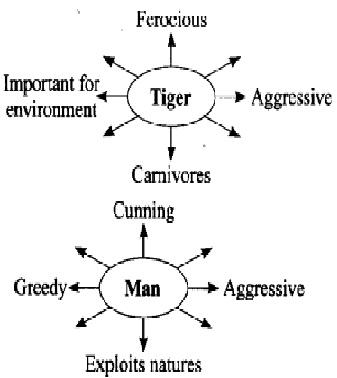Class 9 - English : Main Course Book
Chapter 3C - Save the Tiger

Top Block 1
Question 1: What is your opinion about ‘Animals behind bars’? Share your views with the class.
Answer:
An animal behind bars is an animal in captivity. The animal is devoid of freedom
which is the basic right of every animal. The animal behind bars is unable to have its food the way it likes. Food is another basic necessity for every living being. The animal behind bar doesn’t get enough space to enjoy all necessary physical activities. In other words, the animal behind bars is dying a slow death everyday.
Question 2: Read through the poem and quickly make a note of any thoughts that come to you, while you are reading it.
(See Main Course Book, Page 63)
Answer:
This poem is about an imaginary debate between a tiger and a man. They are debating about who is stronger between them. The man says that he is all powerful because man can control any animal. The tiger in the reply says that if he takes control, he will be too hot to,handle for the man. The poet has used interesting analogy of a sculptor to depict the master and the subject in this poem.
Question 3: Answer the following questions by ticking the correct options:
- What was the cause of the dispute between the tiger and the man?
(a) to establish who was superior.
(b) to prove beasts were inferior.
(c) to justify that beasts should be caged.
(d) to prove that man was more intelligent. - What did the man do to prove his point?
(a) he caged the tiger.
(b) he carved a statue of a man riding a tiger.
(c) he put the tiger in a cage.
(d) he enslaved the tiger. - What was the tiger’s counter-argument?
(a) he said that he was the king of the jungle.
(b) he claimed he ruled the world.
(c) he said the situation would be reversed if he was the sculptor.
(d) he threatened to devour the man in a moment
Answer:
1. (a)
2. (b)
3. (c)
Question 4: In pairs discuss the qualities and characteristics of the tiger and the man.

Answer:

Question 5: Working in groups of four, write a dialogue between
- A tiger behind bars and a man
- A man in a cage and a tiger
Answer:
- A tiger behind bars and a man
Man : “Ha! Ha! Finally I got you. Now you will dance to my tunes.”
Tiger: “Please leave me. I cannot live in this small space. I long for my jungle.” - A man in a cage and a tiger Man: “My family is waiting for me.
They will die without me.” Tiger: “You have been catching us for ages. Now it is our turn.”
Question 6: Listen to the extract on Tigers and as you listen, complete the summary given below.
Answer:
For self-attempt.
Question 7: Fill in the blanks:
1. The next generation is not likely to see the tiger because of …………………….
2. …………………….laws against poachers must be enforced.
3. The responsibility of protection of the tiger lies with …………………….
4. One of the reasons for the Tiger becoming extinct is …………………….
5. Destroying nature means …………………….
6. (a) …………………….and (b)…………………….are different types of tigers.
7. …………………….is a wild life conservation project.
8. Tigers are found in the evergreen and monsoon forests of …………………….
9. Though tigers are mostly nocturnal, ……………………. Species may also be active during the day.
10. The body length of the tiger is …………………….cm.
Answer:
1. decreasing population of tiger.
2. Stringent
3. the government specially the forest department.
4. the loss of the habitat.
5. destroying ourselves.
6. (a) Bali,
(b) Javan, Caspian tigers
7. Project Tiger
8. the Indo-Malayan region.
9. the Siberian
10. 140-280
Mddle block 1
Question 9:
After reading the information given in C.8, complete the table given below by filling in the blank spaces.
| Sub species | Countries | Estimated Population | |
|---|---|---|---|
| Minimum | Maximum | ||
| P .t. altaica Amur | (a)……………………………….. | (b)……… | (c)……… |
| Royal Bengal Tiger | India | (d)……… | (e)……… |
| P. t. corbetti (IndoChinese tiger) | China | (f)………… | 40 |
| P. t. sumatrae, (Sumatran Tiger) | (g)…………………………………. | 400 | (h)………… |
Answer:
| Sub species | Countries | Estimated Population | |
|---|---|---|---|
| Minimum | Maximum | ||
| P .t. altaica Amur | Russia | 415 | 476 |
| Royal Bengal Tiger | Bangladesh, Bhutan, China, India, Nepal | 3060 | 5005 |
| P. t. corbetti (IndoChinese tiger) | Combodia, China, Laos, Malaysia, Myanmar, Thailand, Vietnam | 1180 | 1790 |
| P. t. sumatrae (Sumatran Tiger) | Sumatra | 400 | 500 |
Question 10: Massive poaching in the past two years has wiped out the entire tiger population at one of the tiger reserves in India,’ says one of the investigation reports.
Study the information in C.7 and C.8 and notice how the number of tigers are falling. Using the information, write a paragraph in about 150 words on Project Tiger.
Answer:
Tigers are very important animals for the ecosystem. But growing human population and growing human greed is endangering the existence of tigers on this planet. Especially in India the tiger population is reduced drastically. At present the estimated population of tiger in India is between 2500 – 3800, which is not a great figure. Many tiger parts are used by humans because of age old misconceptions. This has always led humans to kill tigers for precious body parts. Apart from this, growing human activity in tiger’s habitat has resulted in creating pressure on tiger population. Deforestation is leading to the loss of habitat for tigers. This can play havoc with the ecosystem as tigers are at the top of the food chain. They help to check the population of many hervbivores under control. Drastic steps need to be taken to ensure survival of tigers. As responsible inhabitants of this planet, it is our duty to leave a prosperous planet for the fixture generations.



